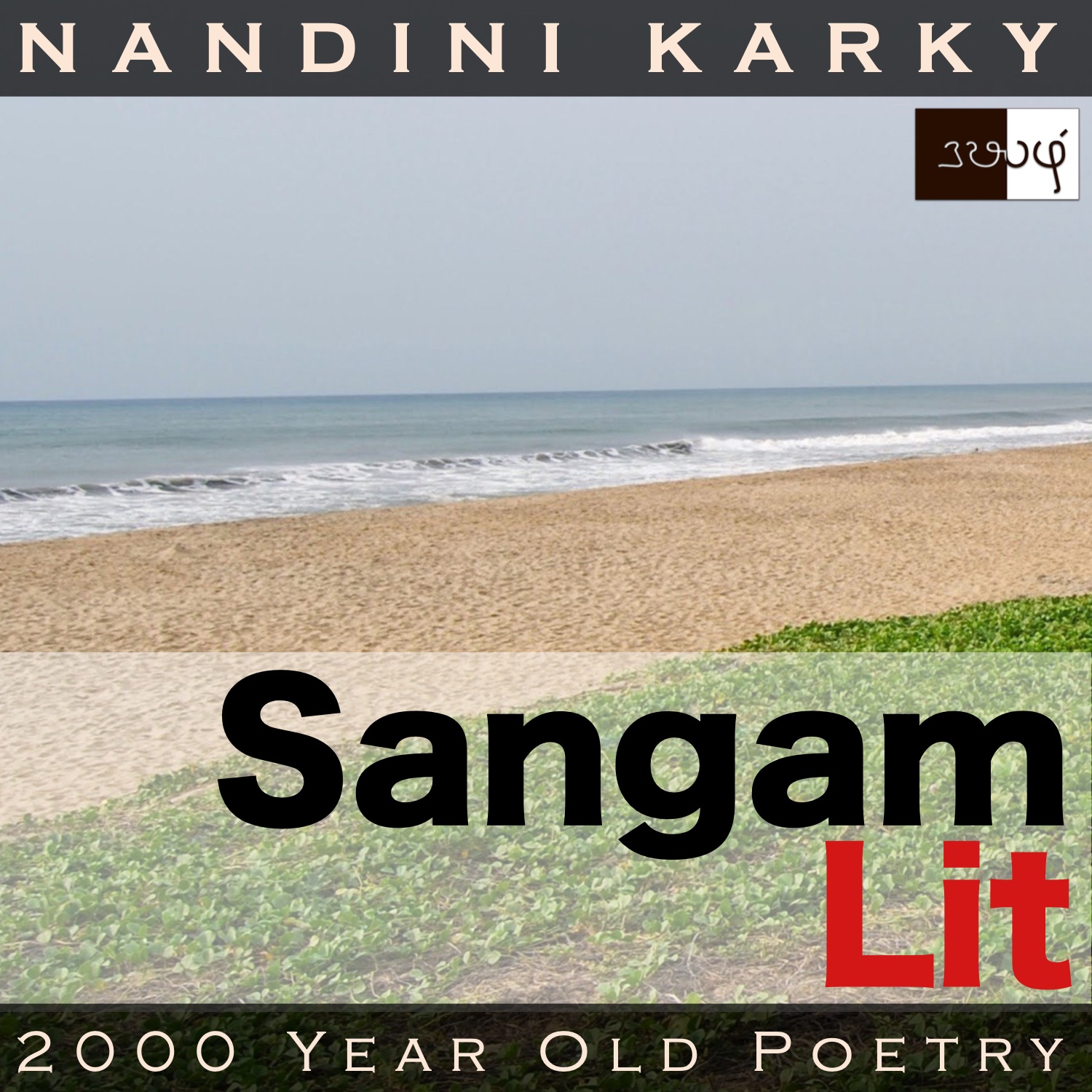Podcast: Play in new window | Download
Subscribe: Apple Podcasts | Spotify | Amazon Music | Android | iHeartRadio | Email | TuneIn | RSS | More

In this episode, we observe inner and outer life by the seas, as depicted in Sangam Literary work, Natrinai 145, penned by Nambi Kuttuvan. The verse is set in the ‘Neythal’ landscape and speaks in the voice of the confidante to the lady, passing on a hidden message to the man, listening nearby.
இருங்கழி பொருத ஈர வெண்மணல்
மாக் கொடி அடும்பின் மா இதழ் அலரி
கூந்தல் மகளிர் கோதைக் கூட்டும்
காமர் கொண்கன், நாம் வெங்கேண்மை
ஐது ஏய்ந்து இல்லா ஊங்கும், நம்மொடு
புணர்ந்தனன் போல உணரக் கூறி,
‘தான் யாங்கு’ என்னும் அறன் இல் அன்னை;
யான் எழில் அறிதலும் உரியள், நீயும்; நம்
பராரைப் புன்னைச் சேரி மெல்ல
நள்ளென் கங்குலும் வருமரோ,
அம்ம வாழி தோழி, அவர் தேர் மணிக் குரலே.
Being a coastal landscape, the poem welcomes us with the sight of salty waters crashing on the wet sands of the shore in ‘இருங்கழி பொருத ஈர வெண்மணல்’. Then, we take in the ‘அடும்பு’ or the ‘beach morning glory’, a rugged creeper that survives in most terrains. ‘அறன் இல் அன்னை’ talks about ‘a mother who’s unjust’. Wonder what she did to earn such an epithet! ‘நள்ளென் கங்குல்’ talks about the ‘middle of the night’ and in that darkness, the poem ends with ‘the sound of chariot bells’ in ‘தேர் மணிக் குரல்’. What could be the story that those bells tell us?
The man and lady have been in a love relationship for a while. The confidante observes the man come by to the lady’s house one night to tryst with the lady. Pretending not to have seen him but making sure he’s in earshot, the confidante says to the lady, “The dark, salty waters crash against the wet, white sands of the shore and there spreads the dark ‘adumbu’ creepers, whose large-petaled flowers are favoured by women with long tresses, who gather these flowers and tie them into a string of flowers for their hair. The lord comes from such a desirable land. When your relationship with him has not yet settled fully well, our unjust mother, thinks that he’s one with you and questions me about where he’s from. She further tries to probe the reasons for the changes in your beauty. Listen, my friend, may you live long! At midnight, in our little hamlet filled with thick-trunked ‘punnai’ trees, won’t the sound of his chariot bells be heard?” With these words, the confidante is hinting to the man listening that the lady’s mother is aware of their relationship and she may soon confine the lady to the house. So, she insists that to avoid losing the lady’s company, the man must seek her hand in marriage, without further delay.
While the end seems the same in many of these songs, let’s explore what different things this particular poem brings to the fore. First, an exploration of a coastal plant! Having seen creepers with purple flowers on beaches in Chennai, somehow I had got it into my head that those were weeds that were growing only because of the pollution. A two thousand year old Sangam song illuminates the truth and makes me see that my perception was wrong. These creepers that are said to spread on the shores of not just the Indian ocean, but even on Pacific and Atlantic shores, and they are found in continents as far apart as Australia and North America. The ‘adumbu’, commonly called as ‘goat’s foot’ or ‘beach morning glory’ is said to be good to hold the dunes in place, thereby preventing erosion. In addition, these plants have also been used as medicine by tribes across centuries. However, in this song, the plant is mentioned for its big-petalled flower, supposedly favoured by Sangam women, who gather the same, tie it into flower garlands and wear on their hair. The confidante mentions this plant saying the lord comes from such a beautiful land. But, something tells me that there must be a bigger reason for such an elaborate mention of this flower!
The confidante then goes into the abstract matter of the lady’s relationship with the man, saying things are not so clear but already mother seems to be aware of the happenings. She informs the lady she thinks so because mother has gone to the extent of directly probing where the man comes from. The confidante sounds worried about mother’s many questions. An unjust mother, she declares, no doubt because the confidante is unable to answer her strict questions. She wonders how she can escape such questions from mother. That too, no matter how much caution the lord may exercise, the sounds of his chariot bells can be heard clearly, in the middle of the night in their little hamlet and there’s no way mother will let the confidante go scot-free, the next time over. These are the words that are said not to the lady, but to the man listening nearby to stress that such meetings will not be possible in the near future and that his best course of action is to seek the lady’s hand in marriage. Reverting back to the opening scene wherein women desire to wear those beach morning glories, the confidante mentions that as a metaphor for the marriage that the lady desires. A string of words that brings to us, a seaside song hidden amidst a string of flowers!




Share your thoughts...